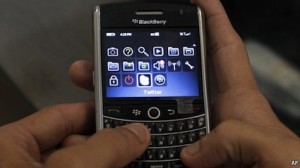UAE, India and Blackberry: Implications for Human Rights Defenders and Freedom of Expression Online
by Guest Contributor / September 3, 2010 / No comments
Telecoms regulators of the United Arab Emirates recently blocked all encrypted email and data communications over Blackberry’s, to the chagrin of many users. The action reduced the high-end devices to little more than mobile phones capable of only SMS and voice calls. Demands for Research In Motion (RIM) to open its encrypted network are not new. Almost two years ago I highlighted similar requests from the Home Ministry in India to RIM. At the time, the Ministry was nervous about RIM mobile devices being used by terrorists in Kashmir. By extension, after the shocking Mumbai terrorist attacks in late 2008, they grew arguably more fearful of Blackberry services.
The United Arab Emirates’ interest in controlling Blackberry communications seems to have a very different reason, even though it was publicly stated – unsurprisingly – the need to monitor communications stems from national security concerns. For sure, as this Economist article emphasizes, terrorists are using RIM devices in the United Arab Emirates.
“In January a team of suspected Israeli agents assassinated Mahmoud al-Mabhouh, a senior man in Hamas, the Palestinian Islamist group, in a hotel room in Dubai. The hit-squad’s members, like the Pakistan-based terrorist group which attacked hotels in Mumbai in 2008, are believed to have communicated securely using BlackBerrys, frustrating a police investigation that identified them by CCTV footage.”
However, as the report by human rights group Frontline notes, authorities are also clamping down on civil protest movements organised using Blackberry communications.
Read the rest of this article from ICT for Peacebuilding (ICT4Peace) here.





